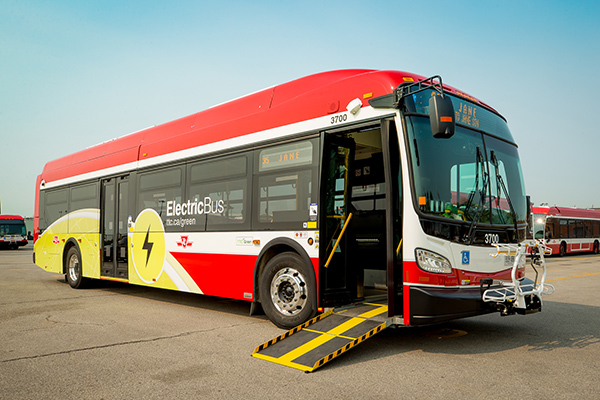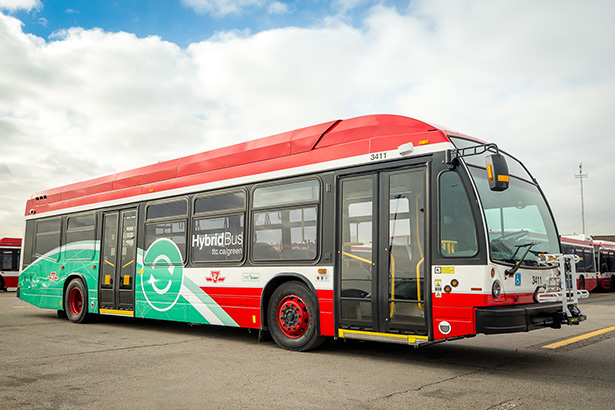TTC Green Initiatives
TTC Green is the pursuit of impactful action towards the reduction of greenhouse gas (GHG) emissions, the increase in resiliency to extreme climate events, the responsible consumption of limited resources and the enhancement of biodiversity, all while maximizing service reliability for our customers.
The Innovation and Sustainability Strategy will be TTC’s strategy to better serve customers, reduce the TTC’s impact on the environment, and harden the TTC’s operational resiliency for extreme weather events.

The TTC continues to modernize our service, and green initiatives are essential to the process. We are working towards a zero-emissions fleet that will continue to deliver safe and reliable service, while decarbonizing our facilities and operations for a greener future.
The TTC’s bus fleet is comprised of three different eco-friendly technologies: clean diesel, hybrid-electric and battery-electric (eBus). Hybrid buses account for almost 30 per cent of our bus fleet. The TTC has purchased additional vehicles that will grow its eBus fleet to 400 vehicles, as we work toward becoming 50 per cent zero-emissions by 2030 and 100 per cent zero-emissions before 2040. This is just one way we are modernizing our service, innovating for the long term and planning for climate change. We will continue to deliver safe, reliable service to our customers with the new, more environmentally-friendly fleet.
-
Electric Buses


Our eBuses operate on truly green technology with the potential for zero tailpipe emissions. The TTC has one of the largest fleets of eBuses in North America; it’s growing to 400 vehicles (or 20 per cent of the TTC’s current fleet). This means customers will see more eBuses operating on routes like 35 Jane, 32 Eglinton and 45 Kipling, reducing air pollution and offering quieter rides.
The TTC's city bus fleet generates more than 79.5 per cent of our direct and indirect GHG emissions. As such, the single most impactful action that we can take is to implement the TTC's Green Bus Program, as the TTC's streetcar and subway fleets are already electric.
By the end of 2030, when our fleet is 50 per cent electric, we will have reduced our bus emissions by more than 60 per cent over the TransformTO baseline year of 2016, all while increasing our fleet size by 6.3 per cent to match increasing customer demand.
-
Electric bus charging

Charge points are installed ahead of eBus deliveries to ensure we continue to provide customers with reliable service. Currently, there are charge points in service across four bus divisions in different areas of the city. There will be 248 additional charge points installed. This will mean the TTC can charge up to 400 eBuses, in line with our incoming deliveries.
Charger technology continues to evolve and we are on the leading edge. Our gradual installation allows us to install new chargers with twice the power output as the ones installed in 2019 in the same sized package.
Fast Fact!
A TTC bus can be charged in three hours but we have the ability to turn down the power output to charge buses slower while they are stored overnight. This minimizes our impact on the grid and means there's more power to share with our neighbours. -
TTC Microgrid

An important piece of the Green Bus Program’s success is the implementation of the charging systems ahead of bus deliveries. We are fortunate that Ontario’s energy sector is among the cleanest in North America. We have power generation (nuclear, hydro, thermal, and wind) from Ontario Power Generation, power transmission through HydroOne, and power distribution from Toronto Hydro all providing primary power to our grid. Substations are then used as an interface from the power grid to our depots to enable the TTC’s microgrid.
The TTC microgrid showcases how
- The substation provided by Toronto Hydro ensures enough electricity is distributed to the site;
- An energy storage system accepts energy, stores energy, and releases energy as needed, providing operating efficiency. It also helps us lower our demand on the grid during peak times;
- An emergency backup generator that provides resiliency to the microgrid, should there be an outage from the main source of energy; and
- Renewable energy that is provided through solar.
-
Hybrid Buses


TTC’s hybrid-electric buses incorporate series technology and run off power generated on-board. As opposed to an eBus that is plugged in to charge, our hybrid-electric buses use on-board generators that are powered by diesel engines. Though these vehicles are still using fuel to produce energy, they use a lot less than the average bus. Hybrid-electric buses also incorporate regenerative braking, meaning that energy produced when descending a hill or during braking is fed back to the energy storage system to reuse for propulsion, resulting in an approximately 25 per cent reduction in fuel use, reducing tailpipe emissions.
A total of 591 hybrid-electric buses have been procured from two manufacturers: New Flyer Industries and Nova Bus. These buses are important as they help us transition our fleet to lower emissions technology while ensuring we are still able to offer the TTC service our customers rely on. The TTC’s bus fleet consists of almost 30 per cent hybrid-electric buses.
Fast Fact!
TTC’s hybrid-electric buses can operate in electric vehicle mode when they enter one of 130 pre-identified Green Zones within the city, a station or a garage, reducing both air and noise pollution. -
Streetcars

The TTC is also growing its streetcar fleet by 30%, which is 60 more low-floor streetcars by the end of 2025. These new vehicles will support existing ridership demand and attract new ridership, while significantly reducing city-wide emissions from higher carbon transportation options.
A larger fleet will support an expanded streetcar network, bringing lower-carbon mobility choices into additional areas of the city through the development of new, more sustainable neighbourhoods.
-
Electric Wheel-Trans fleet
The TTC is evaluating battery-electric alternatives for Wheel-Trans vehicles by procuring and testing five all-electric Wheel-Trans buses. The vehicles are expected to be in service for testing in 2026. In preparation, electric charging infrastructure will be installed at the TTC’s Lakeshore Garage prior to vehicle deliveries. The goal is to have a fully electric Wheel-Trans fleet before 2040.
Through this energy transition, our primary goal remains to provide a fully accessible vehicle that meets the needs of our customers. As such, the Advisory Committee on Accessible Transit (ACAT) will be a key evaluator for new electric Wheel-Trans buses.
Fast Fact!
Our last diesel Wheel-Trans bus was decommissioned in 2023. As the fleet transitions from diesel to gasoline to battery-electric, the total GHG emissions intensity decreases. With an electric Wheel-Trans fleet, the GHG emissions intensity is anticipated to be reduced to approximately a quarter of the emissions of an average personal non-electric vehicle. -
LED Lighting Retrofit
By the end of 2025, all TTC subway stations and platforms will be retrofitted with energy efficient LED bulbs.
Fast Fact!
Between 2019 and 2023, more than 55 thousand bulbs on TTC property were replaced with LED bulbs. This means saving almost six million kilowatt hours annually, equivalent to powering 600 homes every year. -
Renewable Energy
The TTC has partnered with PowerON, a subsidiary of Ontario Power Generation, to implement rooftop solar panels at TTC facilities. The initial installation will take place at Hillcrest Complex in 2025 on the following facilities: Subway Operations, Streetcar Way, and Harvey Repair Shop.
Renewable energy generation at Hillcrest Complex is estimated to be a total size of 900 Wdc and generate 1.070 GWh of clean electricity per year. This amount of electricity will help offset approximately 6 per cent of electricity usage at Hillcrest substation.
-
Green Roofs
.jpg?rev=53a907b19b7f4f048b50990c9ca1c0c8&hash=F66B37314434BC13D876CE068C47995A)
Green roofs are roofs of buildings that are covered either partially or completely with a thin layer of vegetation. They offer benefits such as air purification, stormwater runoff control, energy load reduction, and habitat creation.
The TTC’s first green roof was installed at Eglinton West Station, which contains a 1,085-square-metre garden. Since then, the TTC has implemented green roofs at 13 of its facilities including:
- Downsview Park Station
- Finch West Station
- York University Station
- Pioneer Village Station
- Vaughan Metropolitan Centre Substation
- Victoria Park Station
- Dufferin Station
- McNicoll Bus Garage
- Leslie Barns Carhouse
- Roncesvalles Carhouse
- Wilson Carhouse
- Hillcrest Complex’s Streetcar Way Building
- Eglinton West Station
-
Green Spaces
The TTC has also partnered with LEAF for over a decade to support five Urban Forest Demonstration Gardens. They are located outside High Park, Bathurst, Old Mill, St Clair, and Spadina stations. These gardens are comprised of native plant species that enhance our communities and biodiversity, and are maintained by generous volunteers.
The TTC works to maximize the benefits of the green spaces we maintain to support local biodiversity.
-
Studies and other initiatives
The TTC also completed a feasibility study on the viability of using a Wayside Energy Storage System within the subway network, which would capture waste energy from accelerating and breaking subway trains and store it for other uses. While the ROI did not prove viable, the knowledge gained in trialing new technologies helps to inform the TTC on future technologies and decisions as well as the industry.
-
Fast facts
- Between 2017 and 2023, the TTC’s hybrid and electric buses have saved an estimated 84 million litres of fuel, equivalent to 34 Olympic sized swimming pools.
- Between 2017 and 2023, the TTC tailpipe emissions are estimated to have decreased by almost 20 per cent organization-wide.
- By taking transit instead of driving, you can decrease over 70% of your greenhouse emissions.
